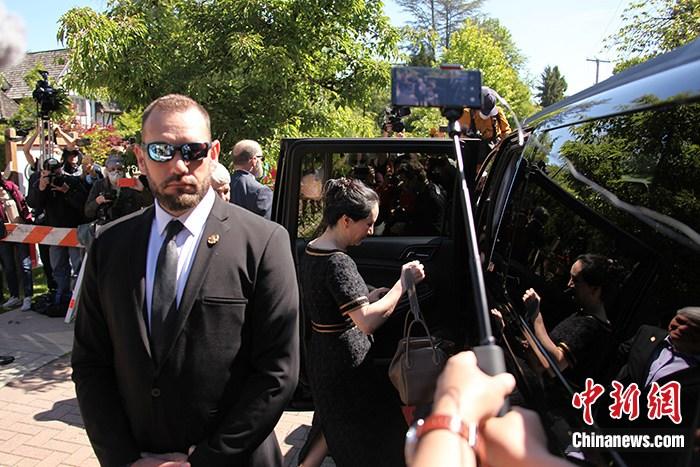China News Service, August 19, reported that Huawei’s vice chairman and chief financial officer Meng Wanzhou’s extradition case ended on August 18, local time in Vancouver, and the judge did not immediately announce the verdict.
The judge is scheduled to hold another hearing on October 21, at which time the final ruling may be announced.
After the trial judge makes a judgment, both the prosecution and the defense have the opportunity to appeal.
If the judge makes an extradition ruling, the case will be handed over to the Canadian Attorney General to decide whether to sign a transfer order.
Meng Wanzhou has been detained by the Canadian government for more than 900 days. China has repeatedly requested Canada to release Meng Wanzhou immediately, but the Canadian side did not agree.
Data map: On May 27, 2020 local time, Huawei's vice chairman and chief financial officer Meng Wanzhou walked out of his residence in Vancouver, Canada, and went to court to hear the ruling.
Photo by China News Agency reporter Yu Ruidong
The whole story of Meng Wanzhou incident
On December 1, 2018, Canada detained Meng Wanzhou who was transiting at Vancouver International Airport at the request of the United States.
She was subsequently released on bail with a bail of 10 million Canadian dollars.
On January 29, 2019, the United States formally proposed to Canada to extradite Meng Wanzhou.
The Canadian Ministry of Justice issued an order to authorize the extradition case on March 1, and the case entered the judicial process of extradition trial.
Since then, the case has been heard several times in the High Court of British Columbia, Canada (also translated as British Columbia) in Vancouver.
On January 20, 2020, the first phase of the formal hearing of Meng Wanzhou’s extradition case began.
In late July, the Canadian Federal Court in Ottawa held a hearing to discuss whether the prosecution should fully disclose the relevant documents of Meng’s detention to Meng’s lawyers.
At the end of September, the British Columbia High Court opened a hearing.
Beginning in early March 2021, the prosecution and the defense have successively conducted court debates around the four branches of "procedural abuse" and the issue of judicial relief.
Meng Wanzhou’s defense lawyer argued that the US and Canadian judicial agencies had "procedural abuse" in the Meng Wanzhou incident, and the defense explained this from four branches.
The defense argued that the judge should comprehensively consider the cumulative effects of various "procedural abuses" and make a decision to terminate extradition, because the suspension of the extradition procedure is the only feasible judicial remedy to compensate for the damage caused by the improper conduct of the extradition requesting country.
On August 18, Vancouver local time, Meng Wanzhou’s extradition case ended all trials.
The judge decided to hold a hearing on October 21 and agreed on a date for the announcement of the verdict.
By August 26, Meng Wanzhou was detained by the Canadian government until the 1,000th day.
Data map: On May 27, 2020 local time, Huawei Vice Chairman and Chief Financial Officer Meng Wanzhou boarded the car outside his residence in Vancouver, Canada, and went to the court to hear the ruling.
Photo by China News Agency reporter Yu Ruidong
China has repeatedly asked Canada to release people immediately
On August 16, Chinese Foreign Ministry spokesperson Hua Chunying emphasized at a regular press conference that the Meng Wanzhou incident was an outright political incident.
She urged the United States to immediately revoke the arrest warrant and extradition request for Ms. Meng Wanzhou. The Canadian side immediately corrected the error, released Ms. Meng Wanzhou, and allowed her to return to the motherland safely as soon as possible.
The spokesperson of the Chinese Embassy in the United States also stated on August 11 that the Meng Wanzhou incident was a typical case of arbitrary detention.
China urges the United States to truly respect the spirit of the rule of law and China's judicial sovereignty, and unconditionally revoke the extradition of Meng Wanzhou.
Huawei Canada issued a statement on August 4, reiterating that Huawei maintains confidence in Meng Wanzhou's innocence and will continue to support Meng Wanzhou in seeking justice and freedom.
On July 12, Chinese Foreign Ministry spokesperson Zhao Lijian stated at a regular press conference that Canada has detained Chinese citizens who have not violated any Canadian laws so far, and has openly acted as an accomplice in the US's suppression of Chinese high-tech companies and Huawei. Arbitrary detention targeting foreign countries".
The US accusation of so-called "fraud" against Meng is purely out of nothing and fabricated out of thin air. "This further exposes the nature of the political persecution of the Meng Wanzhou incident."

